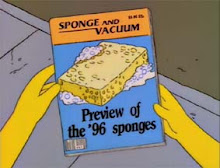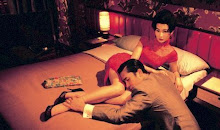Defensive Cinema is a series devoted to films seemingly dismissed by the greater population. And me getting all defensive like and telling you why my opinions hold more water than yours.
"When this fire starts, it is very hard to put out. The tender boughs of innocence burn first, and the wind rises... And then all goodness is in jeopardy."
I understand any fan's disappointment over not getting closure to the classic series Twin Peaks. No new revelations, no Doppelganger Dale Cooper. And I certainly can't blame them for being angry at not seeing its many beloved characters back in their eerie, offbeat digs -- especially when in the place of that is the most depressingly dark incest drama you'll ever see. It's befitting then that the film opens with piercing screams as a television set is smashed to bits. Twin Peaks: Fire Walk With Me seems best suited to fans of the director's most ambiguous efforts. Those tuning in just for the coffee and cherry pie are about to get served something blacker than midnight on a moonless night.
David Lynch always saw Twin Peaks as a show about a girl, Laura Palmer. It's quite clear that when the series lost sight of her, it did (ever so slightly) derail. Once the mystery of her killer was solved, the series inevitably had to lose much of its compelling center. Pushing the focus in on Laura, as this "prequel" does, ultimately pushes the familiar setting into its most strange places, to the aid of some deeply disturbing and moving cinema, but to the loss of narrative ease and the characteristic charms of its TV origins. I'm content with that since it's another of Lynch's abstract art-pieces. His best films are something to experience, and despite this film's darkest recesses of innocence lost, it's one to lose yourself in. More often than not threads of the story seem senseless or random, and yet their placement, their staging, their overall essence render them completely captivating. No one turns Americana into atmospheric hell better than Lynch. We're not in Kansas anymore. We're WAY off the map.

Donna: Do you think if you were falling in space you would slow down after awhile, or go faster and faster?
Laura: Faster and faster. And for a long time you wouldn't feel anything... Then you'd BURST into fire. Forever. And the angels wouldn't help you, because they've all gone away.
Sheryl Lee gives a singular, pulverizing performance that surpasses anything we've seen from her as either Laura or Maddie on the series. She plays each of her scenes on the verge of a painful hysteria - a lost little girl and a madwoman confined behind her last shred of sanity, and her last days on earth. She extends her emotions beyond the obvious sympathy though: the fact that Laura's merely a child who has been sexually abused by the men of her idyllic small town for the better (worst) part of her life. Laura knows she has nothing left, even if she's so far been able to veil her consuming inner demons behind charity work and a spiraling drug addiction. She is a girl on fire whose only hope is to be extinguished, and perhaps the most grim notion of the film is that Laura knows, and occasionally desires, that her end is near.

David Lynch's directorial feat is breathtaking all the while offputting. The content is hideously ugly yet masked behind layers of visual arrest, and Angelo Badalamenti's masterful mix of melancholy jazz fusion consistently punctures through to the film's bleak heart. This film's no different from Lynch's infinitely more praised Lost Highway or Mulholland Dr., as it channels lives in the balance like the static fuzz of an electrical current. Images and characters speak in riddles, and the audience becomes a confused passerby in Laura's tragic dual dimensions. The picture postcard perfection of Twin Peaks shreds through to each of her chilling alternate worlds: the photo of a doorway that leads back to the bedroom where her nightmares began, a Canadian bar where she becomes a teenager transformed for male pleasure, and a Red Room which holds all of Laura's misery, madness, and maybe her only existence of hope.

Fire Walk With Me is at once a harrowing horror film, an oddball family drama, a surrealist satire, and above all the devastating attempt to peel back the layers of a homecoming queen whose life and death has been "wrapped in plastic." If the series is about the pieces of a town left in mourning, Fire Walk With Me is about the primal scream that shatters it.
--There's even more Lynch-inspired love for Laura Dern in my latest "Signatures" post at Film Experience. I promise... no more talk of incest, just huffing paint.





























